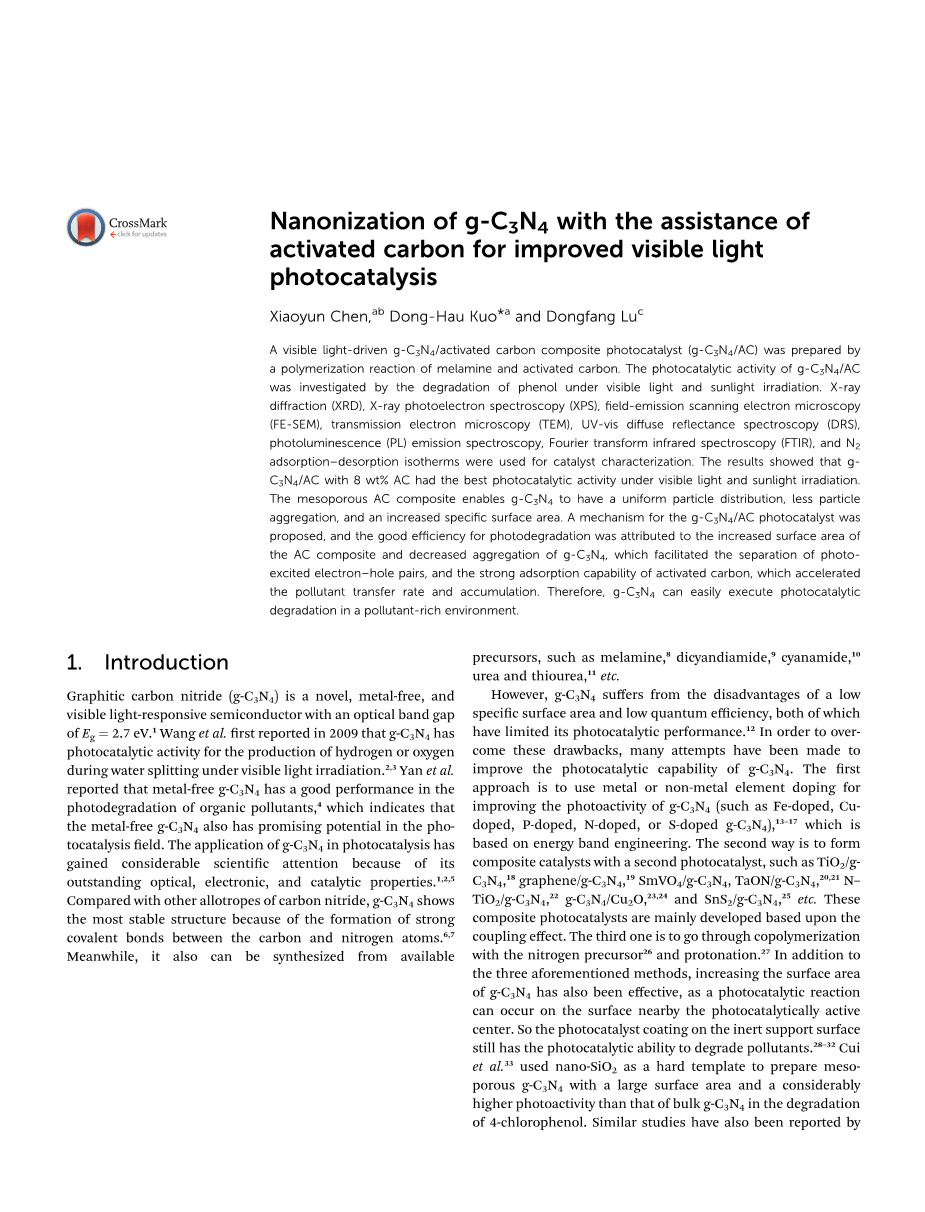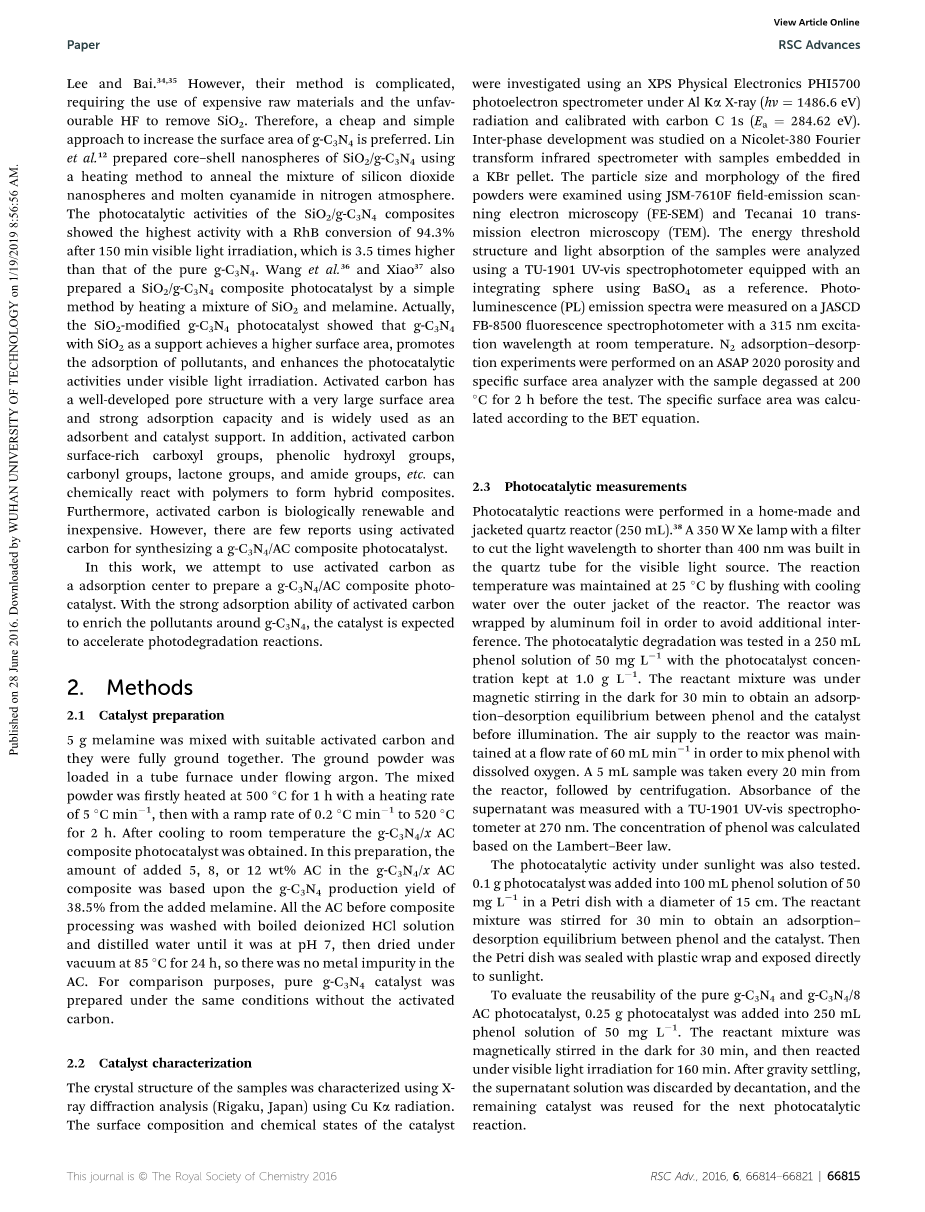

英语原文共 8 页
Nanonization of g-C3N4 with the assistance of activated carbon for improved visible light photocatalysis
(在活性炭的帮助下,氮化碳可以纳米化来提高可见光的光催化作用)
A visible light-driven g-C3N4/activated carbon composite photocatalyst (g-C3N4/AC) was prepared by a polymerization reaction of melamine and activated carbon. The photocatalytic activity of g-C3N4/AC was investigated by the degradation of phenol under visible light and sunlight irradiation. X-ray diffraction (XRD), X-ray photoelectron spectroscopy (XPS), field-emission scanning electron microscopy (FE-SEM), transmission electron microscopy (TEM), UV-vis diffuse reflectance spectroscopy (DRS), photoluminescence (PL) emission spectroscopy, Fourier transform infrared spectroscopy (FTIR), and N2 adsorption–desorption isotherms were used for catalyst characterization. The results showed that gC3N4/AC with 8 wt% AC had the best photocatalytic activity under visible light and sunlight irradiation. The mesoporous AC composite enables g-C3N4 to have a uniform particle distribution, less particle aggregation, and an increased specific surface area. A mechanism for the g-C3N4/AC photocatalyst was proposed, and the good efficiency for photodegradation was attributed to the increased surface area of
the AC composite and decreased aggregation of g-C3N4, which facilitated the separation of photoexcited electron–hole pairs, and the strong adsorption capability of activated carbon, which accelerated
the pollutant transfer rate and accumulation. Therefore, g-C3N4 can easily execute photocatalytic degradation in a pollutant-rich environment
(可见光可以驱动由三聚氰胺与活性炭的聚合而制造出来的g-C3N4,与活性炭复合光催化剂。通过苯酚在可见光和日光的照射下可以调查出g-C3N4/AC的光催化活性。X射线衍射(XRD),X射线光电子能谱(XPS),场发射扫描电子显微镜(FE-SEM),透射电子显微镜(TEM),紫外 - 可见漫反射光谱(DRS),光致发光(PL) 发射光谱,傅里叶变换红外光谱(FTIR)和N2吸附 - 解吸等温线用于表示催化剂的性能。结果表明,在可见光和日光照射下,8wt%AC的gC3N4 / AC具有最佳的光催化活性。中孔AC复合物能使g-C3N4颗粒分布均匀,颗粒聚集较少和比表面积增加。有人提出了gC3N4 / AC光催化剂的机理,光降解效率良好的原因是AC复合材料表面积的增加和gC3N4的聚集减少,这些会促进光激发电子-空穴对的分离以及活性炭的强吸附能力,加速了污染物的转移和积累。因此,氮化碳在富含污染物的环境中可以很容易的进行光催化降解)
-
Introduction
Graphitic carbon nitride (g-C3N4) is a novel, metal-free, and visible light-responsive semiconductor with an optical band gap of Eg = 2.7eV. Wang et al. first reported in 2009 that g-C3N4 has photocatalytic activity for the production of hydrogen or oxygen during water splitting under visible light irradiation.Yan et al. reported that. The application of g-C3N4 in photocatalysis has gained considera metal-free g-C3N4 has a good performance in the photodegradation of organic pollutants,which indicates that the metal-free g-C3N4 also has promising potential in the photocatalysis field ble scientific attention because of its outstanding optical, electronic, and catalytic properties. Compared with other allotropes of carbon nitride, g-C3N4 shows the most stable structure because of the formation of strong covalent bonds between the carbon and nitrogen atoms.Meanwhile, it also can be synthesizefromavailableprecursors,suchasmelamine,dicyandiamide,cyanamide,urea and thiourea, etc.
(石墨碳氮化物(g-C3N4)是一种新型的,无金属的,可见光响应的半导体,其光学带隙为Eg = 2.7eV。王先生以及他的团队2009年首次报道,g-C3N4在可见光照射下的水分解过程中具有光催化活性,可产生氢气或氧气。严先生和他的团队报道说,无金属g-C3N4在有机污染物的光降解中具有良好的性能,这表明无金属的g-C3N4在光催化领域也具有很大的潜力。由于其优异的光学,电子和催化性能,g-C3N4在光催化中的应用获得了相当大的科学关注。与其他碳氮化物同素异形体相比,在碳和氮原子之间形成强共价键,g-C3N4显示出最稳定的结构。同时,它也可以由可用的前体合成,例如三聚氰胺,双氰胺,氨腈,尿素和硫脲等。)
However, g-C3N4 suffers from the disadvantages of a low specfic surface area and low quantum efficiency, both of which have limited its photocatalytic performance.In order to overcome these drawbacks, many attempts have been made to improve the photocatalytic capability of g-C3N4. The first approach is to use metal or non-metal element doping for improving the photoactivity of g-C3N4 (such as Fe-doped, Cudoped, P-doped, N-doped, or S-doped g-C3N4), which is based on energy band engineering. The second way is to form composite catalysts with a second photocatalyst, such as TiO2/gC3N4, graphene/g-C3N4, SmVO4/g-C3N4, TaON/g-C3N4, N–TiO2/g-C3N4, g-C3N4/Cu2O, and SnS2/g-C3N4, etc. These composite photocatalysts are mainly developed based upon the coupling effect. The third one is to go through copolymerization with the nitrogen precursor and protonation.In addition to the three aforementioned methods, increasing the surface area of g-C3N4 has also been effective, as a photocatalytic reaction can occur on the surface nearby the photocatalytically active center.
(然而,g-C3N4具有低特定表面积和低量子效率的缺点,这两者都限制了其光催化性能.为了克服这些缺点,已经进行了许多尝试来改善g-C3N4的光催化能力。第一种方法是使用金属或非金属元素掺杂来改善g-C3N4的光活性(如Fe掺杂,Cu掺杂,P掺杂,N掺杂或S掺杂的g-C3N4), 这是基于能带工程。第二种方法是与第二种光催化剂形成复合催化剂,如TiO2 / gC3N4,石墨烯/ g-C3N4, SmVO4 / g-C3N4,TaON / g-C3N4,N- TiO2 / g-C3N4,22g-C3N4 / Cu2O,和SnS2 / g-C3N4,25等。第三种是与氮前体共聚和质子化。 除了上述三种方法之外,增加g-C3N4的表面积也是有效的,因为光催化反应可以发生在光催化活性中心附近的表面上)
So the photocatalyst coating on the inert support surface still has the photocatalytic ability to degrade pollutants. Cui et al. used nano-SiO2 as a hard template to prepare mesoporous g-C3N4 with a large surface area and a considerably higher photoactivity than that of bulk g-C3N4 in the degradation of 4-chlorophenol. Similar studies have also been reported by Lee and Bai, However, their method is complicated,requiring the use of expensive raw materials and the unfavourable HF to remove SiO2. Therefore, a cheap and simple approach to increase the surface area of g-C3N4 is preferred. Linet al.prepared core–shell nanospheres of SiO2/g-C3N4 using a heating method to anneal the mixture of silicon dioxide nanospheres and molten cyanamide in nitrogen atmosphere.
(因此,惰性载体表面上的光催化剂涂层仍具有降解污染物的光催化能力。崔先生等人使用纳米二氧化硅作为硬模板制备介孔g-C3N4,其具有大的表面积和比体相g-C3N4在4-氯苯酚降解中高得多的光活性。 Lee和Bai也报道了类似的研究。然而,它们的方法很复杂,需要使用昂贵的原料和有毒的HF来除去SiO2。因此,优选廉价且简单的增加g-C3N4表面积的方法。 使用加热方法,在氮气氛中使二氧化硅纳米球和熔融氨腈的混合物退火,从而制备SiO2 / g-C3N4的核 - 壳纳米球。)
The photocatalytic activities of the SiO2/g-C3N4 composites showed the highest activity with a RhB conversion of 94.3% after 150 min visible light irradiation, which is
资料编号:[3655]
您可能感兴趣的文章
- 播撒生物炭促进鸟粪石形成,但加速重金属积累外文翻译资料
- 钢铁工业余热有机朗肯发电的能量及炯分析外文翻译资料
- 深度共晶溶剂微波辅助处理木质素-碳水化合物复合 物的高效裂解及超快提取木质素低聚物外文翻译资料
- 功能化杯状芳烃离子团族[4]的合成、晶体结构及竞争结合性能外文翻译资料
- 面向高能量密度柔性超级电容器的无纺布用黑磷杂化微纤维的微流控纺丝结构外文翻译资料
- 活性炭对水溶液中氨的吸附外文翻译资料
- 制备可控海胆状NiCo2S4微球协同硫掺杂石墨烯作为高性能 二次锌空气电池的双功能催化剂外文翻译资料
- 钛酸盐材料对重金属离子的吸附外文翻译资料
- CO2敏感催化剂的合成与表征温度响应催化聚离子液体微凝胶外文翻译资料
- 温度响应微凝胶薄膜在湿环境中作为可逆二氧化碳吸收剂外文翻译资料


